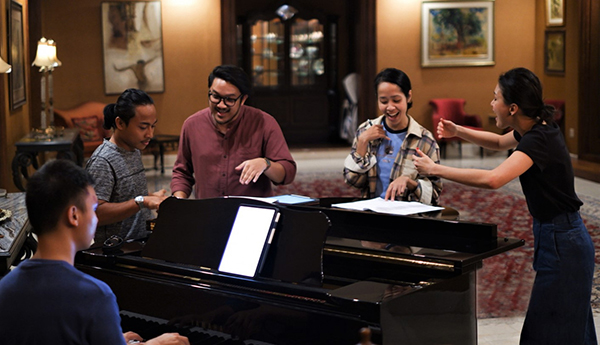ArtsEquator’s Southeast Asia Radar features articles and posts about arts and culture in Southeast Asia, drawn from local and regional websites and publications – aggregated content from outside sources, so we are exposed to a multitude of voices in the region. In the weekly Southeast Asia Radar, we publish a round-up of content that have been scoured and sifted from a range of regional news websites, blogs and media platforms.
Here is this week’s Southeast Asia Radar:

#StartSpeaking: Play sets to put sexual violence in the spotlight
Jakarta Post, Indonesia
““We deliberately created a musical drama to explore what is seen on stage – a lavish, lighthearted musical, but we know that there are terrible things happening backstage where people are suffering but are expected to not speak up because they will take the blame,” he said, adding that the team wanted the audience to ponder the contrast.
Due to the sensitive theme of the production – which will be staged on March 6-8 at Institut Française d’Indonesia in Jakarta with tickets priced at Rp 350,000 (US$25.61) – trigger warnings will be provided and an on-location psychological support will be provided by sexual violence survivors’ support group Lentera Sintas Indonesia.”

The blanket that protects
Bangkok Post, Thailand
“Protection International (PI) Thailand, a non-profit organisation researching strategies and security-management tools that protect human rights defenders, and the Canadian embassy in Thailand, played a vital role in staging this year’s event, which received a warm welcome from the public judging from the attendance of visitors.
PI representative Pranom Somwong, who helped propel the event from day one, said it was encouraging to observe the enthusiasm with which grass roots female human-rights defenders had collectively bonded by using quiltmaking as a means of showcasing their fight for justice and promotion of human rights.
“Each quilt tells a story of injustice and the fire in each woman to overcome her struggles by acquiring a relentless spirit to seek justice for their families and communities,” remarked Pranom.”

For the love of art – Valentine’s Day with 5 art world couples
Plural Art Mag, Singapore
“”The day the postman delivered the letter, Milenko happened to be home, having just returned from a visit to his parents, back in Yugoslavia. He had brought a few bottles of Rakija [a potent traditional fruit brandy] with him and, by the time I arrived home from my classes, I found Milenko and the postman happily tipsy, “celebrating” the good news we had been impatiently waiting for. We got married in March 1975 and I left my country – for the first time and forever – in August 1975.
Settling into married life in what was then the Socialist Federal Republic of Yugoslavia, the artist duo at first maintained independent art practices – Delia in ceramics and Milenko in painting. The political situation in the country, however, was becoming more and more unstable, with increasing civil unrest.”

What went wrong in Ballet Philippines?
Philippine Daily Inquirer
“The dance community is emotional about Reyes’ impending departure and the recently announced appointment of a foreign artistic director, with supporters insisting she was not consulted in the process. BP dancers say the confusion was triggered by the board’s lack of transparency. They believe due process (an audition for the board and the company), as expected of performing arts companies, was not observed.It appears that the bigger concern is Reyes possibly leaving the company in an atmosphere of discord.”

Anyathian – The miniature version of history
Myanmar Times
“Htun Nay Myo Aung and Htet Myat Thu founded the group last year, inspired by discoveries from the government’s Department of Archeology in 1969 of tools from a Paleolithic culture.
In Burmese “anyathu” means “person from the north [of Myanmar], and so the discovers prompted the naming of the people as northerners and their relics as “Anyathian”. They are said to have inhabited the northern parts of Myanmar, bordering China and Thailand, around 10,000 years ago.”

Cambodian painter Pen Robit offers snapshots of reality through his colourful art
The Star, Malaysia
“If he didn’t become an artist, he would probably be a drug addict. Cambodian artist Pen Robit says this quietly, seriously.
“It was art that saved me from this fate, it transformed my life, ” he says.
The 29-year-old simply feels that it would have been all too easy to go down that path in a world where “even young children openly sniff glue by the roadside”.”

In Defense of Bảo Tàng Địa Chất, Saigon’s Most Neglected Museum
Saigoneer, Vietnam
“For years, Saigoneer’s editorial staff has discussed visiting and writing about the Geological Museum (Bảo tàng Địa chất), but it never got done. I’ve lived here for half a decade, and when I moved to a new neighborhood a year ago my daily walk to the office took me past the museum; yet I still had never entered. Then, on a whim, one random Tuesday morning several weeks ago, I went. The result? I didn’t think I could love Saigon more than I already did, and yet…”

After 46 years, Malaysian sitarist still playing instrument to keep father’s legacy alive
Malay Mail, Malaysia
“Samuel’s relationship with the sitar started when he was only five, as his father, Jabamalai Dass, a sitar player attached with Radio Televisyen Malaysia (RTM) influenced him to pick up the instrument.
“He taught me the basics of the sitar because at that time, he was diagnosed with cancer and he wanted me to be able to play the instrument.
“After three years, he passed away, and I continued to play the instrument because I missed my father and his moments with the sitar,” he said.”
About the author(s)
Nabilah Said is an award-winning playwright, editor and cultural commentator. She is also an artist who works with text across various artforms and formats. Her plays have been staged in Singapore and London, including ANGKAT, which won Best Original Script at the 2020 Life Theatre Awards. Nabilah is the former editor of ArtsEquator.

